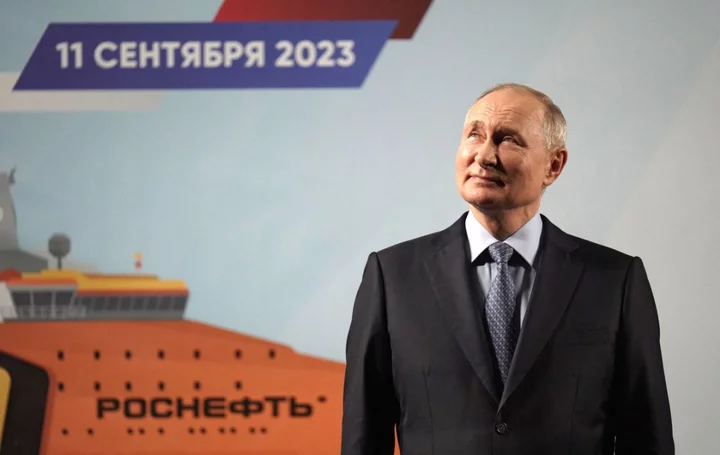
Putin’s shameless UN charm offensive - with stolen grain from Ukraine
A desperate Vladimir Putin, increasingly isolated on the world stage, is eyeing a return to the UN Human Rights Council – and he has launched a shameless charm offensive to get him there. Armed with stolen Ukrainian grain, the Russian president is on a mission to curry favour with potential backers ahead of a vote for council membership next month, although his efforts are likely to fall short. Two years after being kicked off the panel for invading its neighbour, Putin has ordered his diplomats to try and secure the backing of enough countries for Moscow to beat two other eastern European nations on 10 October. A Russian position paper circulated to dozens of other countries ahead of the vote strikes a markedly different tone to the nuclear threats and wartime sabre-rattling of Putin’s addresses since he invaded Ukraine, calling for “constructive mutually respectful dialogue” and referring to the 47-member Human Rights Council as “a key body in the United Nations system”. Russia is competing with Albania and Bulgaria to win one of two spots up for grabs on the council that are reserved for central and eastern European nations. Ironically one of the countries being replaced is in fact Ukraine – its and the Czech Republic’s terms are expiring. Moscow is going all out to try and reverse the April 2022 vote that saw it booted, experts tell The Independent. Then, 93 countries voted in favour of suspending Russia, while 24 voted against and 58 abstained. “Russia is apparently offering incentives such as grain and arms in exchange for votes. Along with other moves to deepen relations with Africa, we know that President Putin had already promised African states grain back in July at the Russia-Africa Summit,” says Yousuf Syed Khan, a senior lawyer at international human rights firm Global Rights Compliance. “At the same time, Russia is engaged in the systematic pillage of Ukraine’s grain, having rebuilt infrastructure to harness the ability to export millions of tonnes from occupied Ukrainian territory into Russia. This is not a coincidence,” the war crimes lawyer adds. Russia has been accused of weaponising global food security in its war against Ukraine, targeting key Ukrainian infrastructure with missile strikes while at the same time pulling out of a UN-brokered deal that had allowed Kyiv to keep exporting grain to other parts of the world where rising food prices are pushing more people into poverty. “The bottom line is that Russia is in no better standing to join the Human Rights Council now than it was nearly 18 months ago when it was voted off. In many ways, its bid to re-join and the outcome of the vote will be a barometer of Russia’s international standing,” Khan says. Alongside what it can offer in terms of trade, Khan says Russia will likely try to convince smaller countries that they do not want to be “instrumentalised to serve the political wills of Western nations”. “This logic may speak to some of the African States that Russia will desperately need to vote in its favour,” he tells The Independent. This tallies with the language in the position paper Russian diplomats have already distributed. The paper says Moscow “believes it is important to prevent the increasing trend of turning the Human Rights Council into the instrument, which serves political wills of one group of countries punishing non-loyal governments for their independent internal and external policy,” reported CNN. Alfred de Zayas, a former independent UN expert on human rights, says he believes the odds are stacked against Russia rejoining the council, despite the concerns voiced in recent days by Western officials. “At present, there are five eastern European states represented in the council – Czechia [the Czech Republic], Georgia, Lithuania, Montenegro and Ukraine. The terms of Czechia and Ukraine expire in December 2023. There are two openings but three candidates – Albania, Russia and Bulgaria,” he tells The Independent. De Zayas says that there was little in Russian foreign minister Sergei Lavrov’s recent comments at the UN General Assembly in New York to suggest a rapprochement with “the collective West” is any nearer. But at the same time, he argues that including Russia on multilateral platforms like the Human Rights Council is exactly what is needed to work towards peace talks to end the Ukraine war. “Maximum inclusiveness, bringing in as many countries as possible would be desirable, so that meaningful exchanges of ideas and perspectives could be conducted. Excluding Russia is counterproductive because it closes an important avenue of compromise and quid pro quo,” says De Zayas. “Precisely because there is a war going on, it is crucial to take advantage of every forum of dialogue,” he suggests. For Khan, however, Russia’s ongoing abuses in Ukraine are likely to see Putin’s charm offensive fall short. “Since the initial days of its full-scale invasion in February last year, Russia has been engaged in starvation as a method of warfare across Ukraine,” he says, recounting Moscow’s significant human rights violations during the conflict. “Unlawful conduct includes the laying of sieges to areas such as Chernihiv and Mariupol while denying access to even the most basic items required for civilian survival such as food, medicine and potable water. “More recently, we have seen Russia attacking grain ports along the Danube, forcing Ukraine to pivot to the Sulina Channel with its exports and to work with Romania, to elicit sanctions relief for Moscow. Russia also destroyed at least 270,000 tonnes of grain in late July and early August alone. None of this is being done with any valid military objective.” The latest report by Mariana Katzarova, the UN’s special rapporteur on Russia’s rights situation within its own borders, noted that rights have been on a “steady decline” over the last two decades but things have “significantly deteriorated since its invasion of Ukraine in February 2022”. Mass arbitrary arrests, detentions and harassment were recorded for “anyone speaking out against Russia’s war on Ukraine or daring to criticise the government’s actions,” the report found. The UN’s website says that “with membership on the [Human Rights] Council comes a responsibility to uphold high human rights standards”. “One would hope that all nations vote in line with the HRC membership criteria,” says Khan, who has worked with the UN for a decade on atrocity inquiries, adding that on this point Russia is falling far short. Read More Ukraine-Russia war - live: ‘Nuclear crisis’ warning over Putin-controlled power plant on the frontline Russia tries to rejoin UN Human Rights Council Russia ‘weaponised food and deliberately caused starvation’ in Ukraine Ukraine repels Russian attacks as Putin’s forces try to recapture territory lost in counteroffensive
2023-09-28 22:17
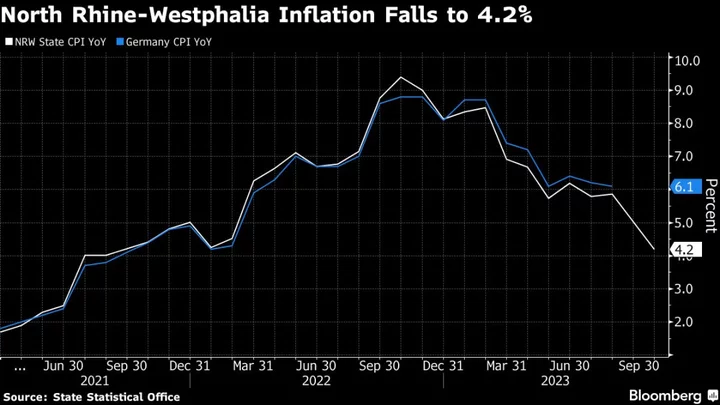
German State Data Points to National CPI Within Survey Range
Inflation in the German state of North Rhine-Westphalia fell to 4.2% on the year in September from 5.9%
2023-09-28 14:58
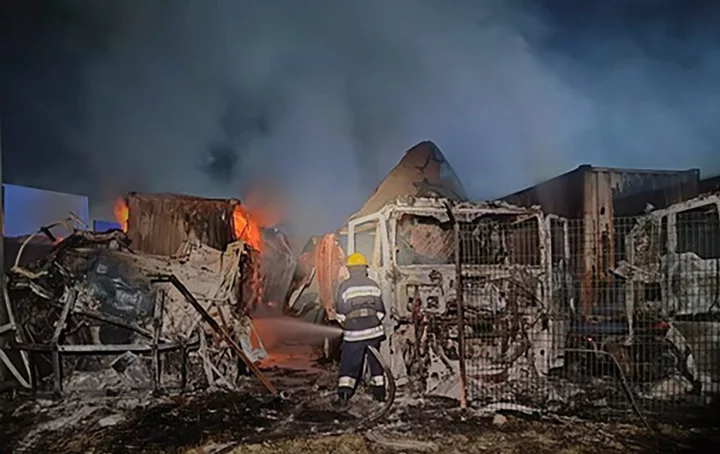
Ukraine war – live: Russia launches over 40 drones in overnight attack from Black Sea
Ukraine says its air defences shot down 34 kamikaze drones this morning and overnight as Russia launched a major new wave of air strikes across the country. Russia’s attacks involved at least 44 Iranian-made Shahed drones in total, according to Ukraine’s Air Force. “Fighter aircraft, anti-aircraft missile units and mobile fire groups were engaged to repel the attack,” Ukraine’s military said on Telegram. A large number of the drones were fired on southern Ukrainian cities from the Black Sea, the air force said. It comes as Kyiv said hundreds of fighters from the Wagner mercenary group have returned to Ukraine to fight in Russia’s continuing invasion for the first time since the group’s leader Yevgeny Prigozhin died in August. The Ukrainian military said it had seen “no significant impact” on frontline dynamics from Wagner’s return to the battlefield, however. Earlier, there were reports that a fresh offensive by Russia’s forces in the coming weeks is “unlikely”, according to British intelligence. Britain’s Ministry of Defence reported that patterns in Russian deployments suggest that Vladimir Putin’s troops are “overstretched” across the frontlines in Ukraine. Read More Viktor Sokolov seen for second time in newly emerged video as he claims Russia’s Black Sea Fleet ‘performing successfully’ New video of ‘dead’ Russian Black Sea fleet commander raises doubts over Ukraine’s claim Hillary Clinton mocks Putin over Nato expansion: ‘Too bad, Vladimir. You brought it on yourself’ Ukrainian forces ‘enjoy success’ near Bakhmut as Putin deploys reserves
2023-09-28 14:29
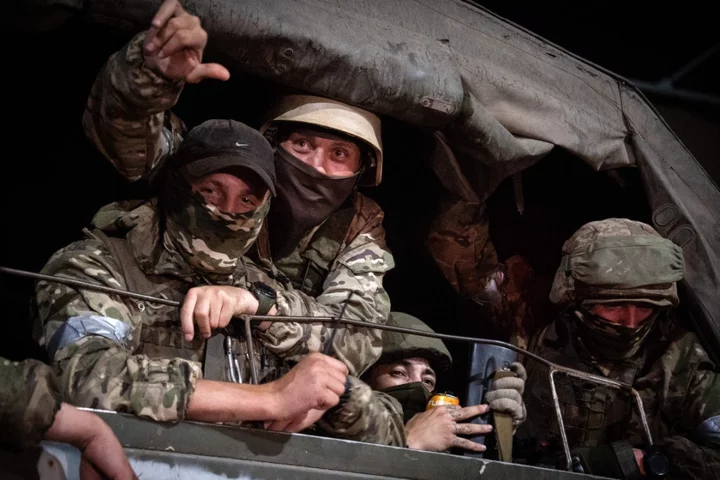
Ukraine says hundreds of Wagner fighters back on battlefield months after failed coup
Several hundred fighters of the Wagner mercenary group have returned to Ukraine to fight in Russia’s continuing invasion but have not made a significant impact on the battlefield, military officials in Kyiv said. "We have recorded the presence of a maximum of several hundred fighters of the former Wagner PMC (private military company)," spokesperson for the eastern military command Serhiy Cherevatyi said. These Wagner fighters were scattered in different places, were not part of a single unit, and had had no significant impact, he said. "They do not constitute any integral, systematic, organised force," the spokesperson said. "As they say – game over. These are pathetic remnants, nothing good awaits them here." The Independent has not verified the reports on Wagner’s return on the battlefield. If confirmed, this will mark the first ever comeback of Wagner in Ukraine after the death of its supreme leader Yevgeny Prigozhin in August. Russia’s Investigative Committee says it has confirmed Wagner chief Yevgeny Prigozhin was killed in a plane crash. On 23 August, Prigozhin’s private jet came down north-west of Moscow, killing all those on board. Video footage showed debris falling from the sky above Kuzhenkino in Russia, with pictures emerging of the wreckage. His right-hand man Dmitry Utkin was also on board the Embraer Legacy 600 jet, as well as five other passengers and three crew members. Russian military bloggers have reported that some Wagner fighters have been returning to Ukraine. The officials in Kyiv condemned the group on Wednesday once again and denied its existence. Ukrainian presidential adviser Mykhailo Podolyak said the group – comprising majorly of prison convicts – no longer existed. "Today, there are only former militants of the terrorist group who have scattered in all directions," he wrote on X, formerly known as Twitter. He said some had gone to Africa, some were dispersed through Russia, and some had contracts with the Russian Defence Ministry and were fighting in the Bakhmut sector. Reports of their return were intended to drown out news of Ukraine‘s recapture of two villages near Bakhmut, the official said. The mercenaries, responsible for carrying out Russia’s dirty work in Africa, also played a crucial role in Russia’s continuing invasion of Ukraine and handed Vladimir Putin one of Moscow’s biggest territorial feats by capturing the eastern city of Bakhmut in May. It came after one of the longest and fiercest battles of Moscow’s 19-month war in Ukraine. But after complaints of ammunition starvation, Wagner chief Prigozhin announced he and his fighters will leave Bakhmut after the battle. Some of them went to Belarus under a deal that ended a brief mutiny by Wagner in June, during which it took control of a Russian military headquarters and marched on Moscow. After Prigozhin’s death, the Kremlin has sought to bring the group under tighter state control. Read More Ukraine repels Russian attacks as Putin’s forces try to recapture territory lost in counteroffensive Ukraine-Russia war – live: Fresh offensive by Putin’s troops ‘unlikely’ as frontline ‘over-stretched’ A month after Prigozhin’s suspicious death, the Kremlin is silent on his plane crash and legacy Inside Ukrainian brigade’s battle ‘through hell’ to reclaim village from Putin’s troops on way to Bakhmut UK officially bans Russia’s Wagner paramilitary group as terrorist organisation
2023-09-28 13:52
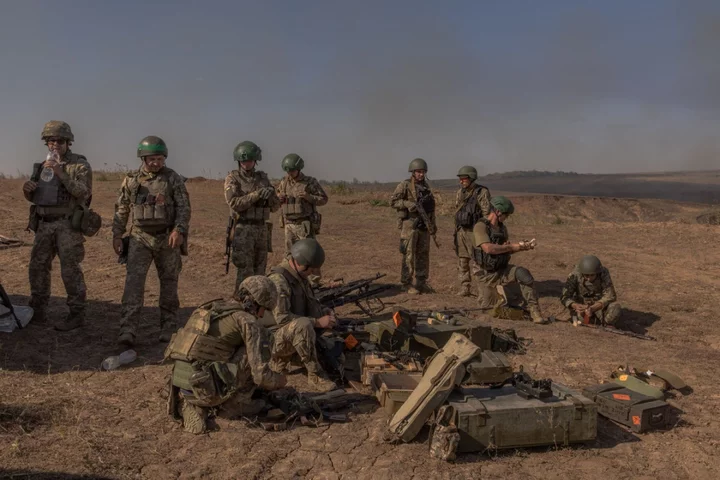
Ukraine repels Russian attacks as Putin’s forces try to recapture territory lost in counteroffensive
Ukrainian soldiers fought off fierce Russian attacks on the battlefield on Wednesday as the invading troops continued to recapture lost territory in eastern Ukraine, military officials said. Some progress was also seen in southern Ukraine – another pocket of heavy territorial battle in Russia’s 20-month-old invasion. "We continue to repel intense enemy attacks near Klishchiivka and Andriivka. The enemy is still storming these positions with the hope of recapturing lost positions, but without success," Ilia Yevlash, a spokesperson for Ukraine‘s eastern group of forces, told national television. The two villages – Klishchiivka and Andriivka – near Bakhmut were retaken from Russian control in mid-September in a span of three days, marking a significant territorial feat in the Ukrainian counteroffensive. There had been 544 Russian shelling incidents in the past 24 hours in the area, seven combat clashes and four air attacks, the military spokesperson said. Officials, including president Volodymyr Zelensky, also confirmed advances in the fighting. “True Ukrainian fury against the occupiers in our Donetsk region! The Bakhmut direction, including fierce battles for Klishchiivka,” he said and mentioned “our advance in the Donetsk sector” in the east but did not share more details. Air strikes were also reported on four localities in the area by Ukraine’s General Staff who said 15 towns and villages had come under artillery and mortar attack in the past day. The heavy fighting in the region was also corroborated by Russia’s defence ministry who mentioned heavy fighting and said its forces had beaten back 10 attacks by Ukrainian troops near Klishchiivka and further south, near the village of Nevelske. In its next target on the battlefield, Ukrainian forces are eyeing several other villages as they progress through Zaporizhzhia region towards the major town of Tokmak. Military analyst Roman Svitan said there have been “three or four days of painstaking hard work by our assault group and commanders in the area which have led to very serious problems for the Russians”. "I would not speak of a breakthrough until we reach Tokmak." Tokmak, a Ukrainian city in south-central point in Zaporizhzhia oblast and just 12 miles from the frontline, is considered to be a critical mark in territorial fight which will give Kyiv’s forces a leverage to advance further and repel more Russian attacks. Ukraine fired its counteroffensive salvo in June to recoup ground in the east. Its forces are also trying to advance southward to the Sea of Azov to sever a land bridge established by Russia between the annexed Crimean Peninsula and positions it holds in the east. Read More Ukraine-Russia war – live: Fresh offensive by Putin’s troops ‘unlikely’ as frontline ‘over-stretched’ Russia airs ‘new interview’ of Black Sea admiral who Ukraine claimed was killed in strike New video of ‘dead’ Russian Black Sea fleet commander raises doubts over Ukraine’s claim Ukrainian forces ‘enjoy success’ near Bakhmut as Putin deploys reserves
2023-09-28 12:26
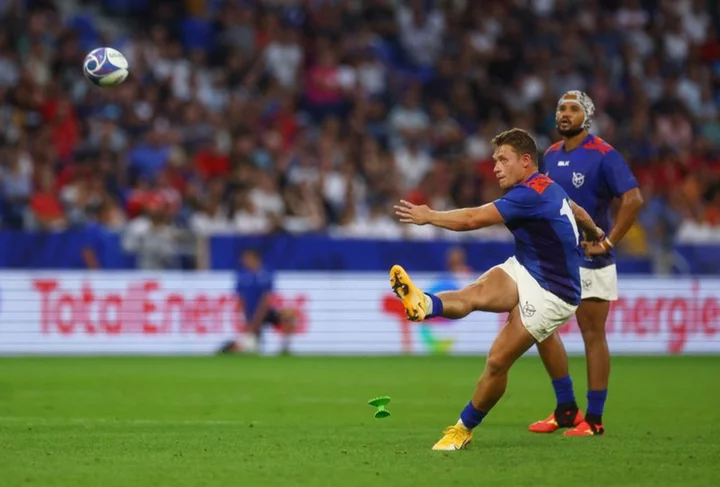
Rugby-Namibia coach calls for change to avoid history repeating itself
LYON, France Namibia’s hopes of a first ever Rugby World Cup win ended in yet another defeat as
2023-09-28 02:54
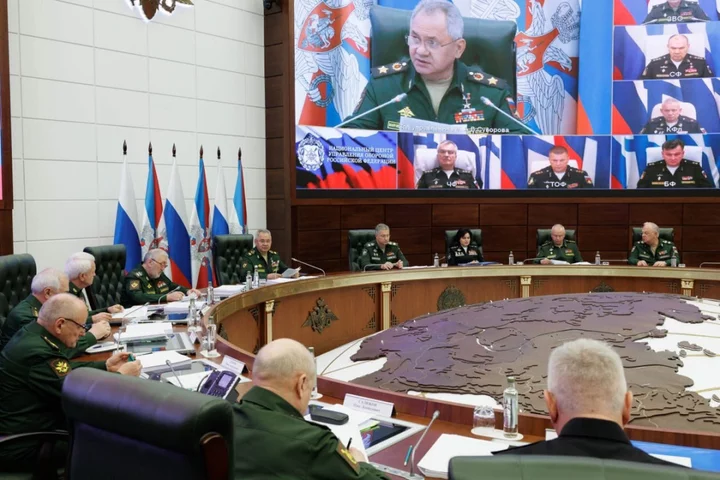
Russia airs ‘new interview’ of Black Sea admiral who Ukraine claimed was killed in strike
Russia has published a second clip purporting to show a top naval officer alive and well, after Ukraine claimed he had been killed in a missile strike on the headquarters of Moscow’s Black Sea Fleet in Crimea. Ukraine’s special forces claimed on Monday that the Russian fleet’s commander, admiral Viktor Sokolov, was among 34 officers killed in the huge strike on Sevastopol, which they said had caused irreparable damage to the headquarters building. But the military body backpedalled the following day, saying its units were “clarifying the information” which had been based on open sources, adding that many of those killed in the strike “still have not been identified due to the disparity of body fragments”. Kyiv’s special forces said the clarification came after Moscow was “urgently forced to publish an answer with an apparently alive Sokolov” – a reference to footage published by Russia’s defence ministry showing Mr Sokolov appearing on a video conference call with defence minister Sergei Shoigu. Admiral Sokolov is also seen on a video screen but in a different location, with only a flag seen in the backdrop behind him. He is also not heard speaking in the video. While this appears to be a signal from Moscow that the admiral is still alive, Russia has not released any details to prove when the video conference took place. In a further twist on Wednesday, Russian defence ministry-linked outlet Zvezda published footage it claimed showed Mr Sokolov speaking to reporters while attending an award ceremony for the Chernomorets Black Sea Fleet football team. But doubts were cast over whether the footage was new, given that Mr Sokolov made no reference to the Black Sea attack in his comments. “The Black Sea Fleet confidently and successfully fulfills the tasks assigned to it by the command,” he can be heard saying in the footage, adding that the exploits of Russia’s marines “practically do not appear on the screens of central television”. While Moscow has not commented directly on Mr Solokov’s status, defence ministry spokesperson Maria Zakharova claimed on Wednesday that there was “no doubt” the attack was “planned in advance using Western intelligence means, Nato satellite assets and reconnaissance planes”. The strike on annexed Crimea “was implemented upon of the advice of American and British security agencies and in close coordination with them”, Ms Zakharova claimed. Ukraine has previously refrained from directly claiming responsibility for strikes on targets in Crimea and Russia for fear of alienating Western allies concerned that such strikes could allow Moscow to claim them as evidence of Nato-sanctioned escalation. However, Kyiv has become bolder in claiming such attacks as part of its wider counteroffensive efforts in recent months, having increased its use of domestically-produced attack drones to strike targets in Moscow, Belgorod and Crimea. In its earlier update on the Sevastopol strike, Ukraine’s special forces said the air force fired 12 missiles on the Black Sea Fleet headquarters as it targeted areas where personnel, military equipment and weapons were concentrated. Two anti-aircraft missile systems and four Russian artillery units were hit, special forces said. Moscow-installed authorities in Sevastopol, annexed by Russia in 2014, are reported to be taking extra defensive measures in the face of Ukraine’s increased attacks on Crimea in recent days. Sevastopol is a critical region providing a platform from which Russia has launched many of its air attacks on Ukraine in the 19-month-long war. Read More Russia remains silent as Ukraine claims Black Sea Fleet commander among 34 officers killed Putin’s Black Sea fleet commander ‘killed in navy attack’ as Ukraine breakthrough triggers ‘panic’ Russia’s Lavrov rubbishes Ukraine peace plan and warns conflict will be resolved on battlefield Ukraine-Russia war – live: Putin planning new ‘assault units’ despite Moscow’s ‘mobilisation issues’
2023-09-27 22:51
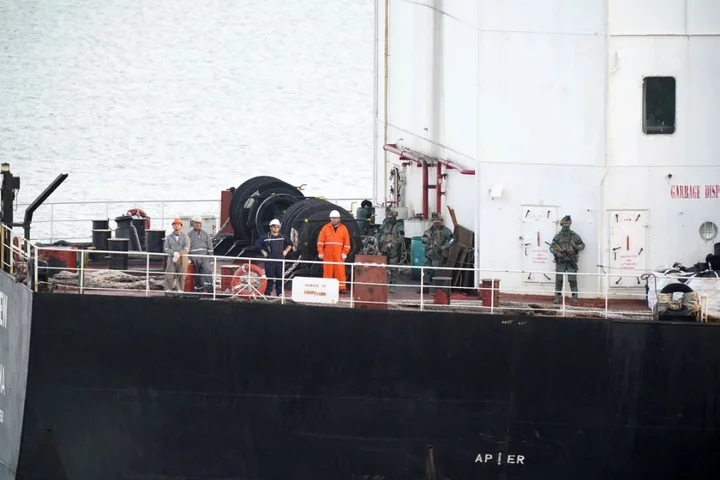
Elite army unit storms ship to seize Ireland’s biggest drugs haul
A €157 million (£136 million) haul of cocaine was seized when an elite army unit stormed a cargo ship off the Irish coast. It is the largest drugs capture in Ireland’s history, police said. A total of 2,253 kg of cocaine was found on the Panamanian-registered vessel in a major joint agency operation off the south-east coast of Ireland on Tuesday. Members of the highly trained Army Ranger Wing descended from a helicopter onto the MV Matthew as it tried to sail out of Irish waters and evade capture. The elite unit boarded the ship after the Irish Naval Service’s patrol vessel, the LE William Butler Yeats, fired warning shots in its direction after it failed to obey orders. The vessel had been under surveillance since Friday when a multi-agency operation responded to intelligence of a major international drug smuggling operation. Speaking at a media briefing in Dublin on Wednesday, a senior member of the Irish police described the operation as “hugely significant”. Justin Kelly, Assistant Commissioner with An Garda Siochana, said: “I think it’s really important to note this is the largest drug seizure in the history of the state. “This is a hugely significant operation and it shows our unrelenting determination to disrupt and dismantle networks which are determined to bring drugs into our country. “These groups are transnational groups. They are working all across the world and, because of that, we need to work with our international partners.” He added: “This is a huge hit for the people involved in this.” ‘Murderous cartels’ Given the scale of the haul, Irish authorities do not believe the cocaine was solely destined for Ireland. They suspect the drugs were being transported from South America for distribution across Europe. The MV Matthew was escorted to Cork harbour on Tuesday. A fishing trawler that grounded off the coast of County Wicklow late on Sunday was also being monitored as part of the operation, amid suspicions it was en route to rendezvous with the cargo ship. The vessel remains stuck on a sandbank out at sea with poor conditions preventing the authorities from boarding and searching it. It will be treated as a crime scene when it is accessed, police said. Three people, aged 60, 50 and 31, arrested during the course of the operation, remained in custody in police stations in County Wexford on Wednesday. It has emerged that one of those arrested was medically evacuated off the MV Matthew before the military operation to seize it. About 25 remaining crew will be interviewed in Cork and police have said further arrests may follow. The operation involved the Defence Forces, customs officers and the Irish police’s national drugs and organised crime unit. Mr Kelly said the cocaine on the ship originated in South America. “This product was supplied by a South American cartel, one of the murderous cartels that are behind cocaine shipments into Europe,” he said. “A shipment like this into Europe is partly destined for the Irish market. “Obviously, with the size and intelligence we have, we know the organised crime group behind this comprises a number of different elements across Europe.” Asked if those on the cargo ship had tried to dispose of the cocaine by burning it or throwing it overboard, Mr Kelly said more information on this would be provided in the coming days. He said such a large shipment would not have entered the state’s waters without the involvement of an Irish gang. He said there are a number of gangs in Ireland with “direct links to South America”. “There is no large ship like this coming into our waters or our ports or transiting across our country, without an Irish organised criminal group involved in it. “There is an increase in the amount of cocaine available for a number of geopolitical reasons in South America. There is basically a glut of cocaine on the market,” he said. “And when you combine that with the increased consumption across Europe, Europe is now the biggest market for cocaine in the world. “So when you combine those two things together, absolutely, it’s inevitable that we’re going to see organised criminal groups trying to leverage on that, make more money from it, as they always do in situations like this. “It’s inevitable that we’ll see more large shipments.” He said increased large shipments had also been seen in Antwerp and Rotterdam. ‘Great deal of skill’ Commander Tony Geraghty, fleet operations officer of the Irish Naval Service, explained why warning shots were fired at the cargo vessel before the boarding operation. “The merchant ship refused to follow the instructions of our own ship,” he said. “So this was prior to the insertion of the Army Ranger Wing. “There was an escalated use of force used to compel the vessel to follow the instructions of the ship’s captain.” Cdr Geraghty said it had been an extremely complex joint operation involving the Naval Service, the Air Corps, the Army Ranger Wing and Defence Forces headquarters. He said the poor weather made the fast rope aerial boarding more complex. He said there was no evidence of the crew being armed when the Army Rangers boarded and took control of the vessel. “This ship is very large, she’s 190 metres long, with an exceptionally high freeboard. So very difficult to get on,” he added. He said a “great deal of skill” was demonstrated by the Army Ranger Wing and helicopter pilot during high winds. Read More British Airways pilot sacked and banned from cockpit after cocaine binge before flight UK’s first drug consumption room enabling supervised injection approved Teacher arrested after students find meth stash inside hair scrunchie during ‘family fun night’ Cocaine haul worth 157 million euro is biggest drug seizure in Ireland’s history Suspected cocaine worth 157 million euro found in Ireland’s biggest drug seizure ‘Danger to life’ warning activated in Britain - live
2023-09-27 22:27
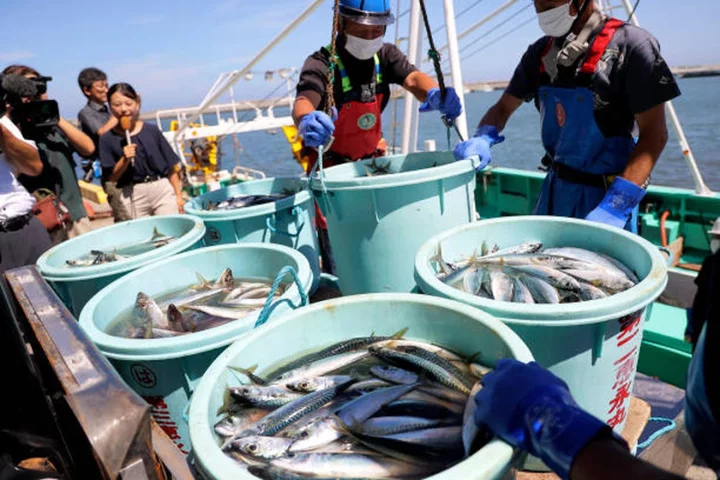
Russia could join China in banning Japanese seafood imports over Fukushima
Russia might join China in banning seafood from Japan over the Fukushima water release, a Russian regulatory authority indicated on Tuesday. Russian food safety watchdog Rosselkhoznadzor said that it had discussed the issue of food exports with its Chinese counterparts. “Taking into account the possible risks of radiation contamination of products, Rosselkhoznadzor is considering the possibility of joining with Chinese restrictions on supplies of fish products from Japan,” the watchdog said in a statement. “The final decision will be made after negotiations with the Japanese side.” Last month, Japan started the discharge of water from the Fukushima nuclear plant into the ocean, a move that sparked intense condemnation from China. In response, China implemented a ban on all seafood imports from Japan. Russia, one of the major suppliers of marine products to China, is actively pursuing opportunities to expand its market share in the region. So far this year, Russia has imported 118 tonnes of Japanese seafood, the regulator said. In response to the announcement by Russia, the top Japanese government spokesperson, Hirokazu Matsuno said on Wednesday that Japan will carefully examine the matter. “We strongly ask Russia to act based on scientific evidence,” Mr Matsuno told the media. He added that Russia was a member of the International Atomic Energy Agency’s Fukushima expert team. “In addition to this, we received an IAEA report made with the participation of international experts, including from Russia.” Rosselkhoznadzor has reached out to Japan, urging both nations to start negotiations and requesting information regarding Japan’s radiological testing procedures for exported fish products, which includes assessing tritium levels. They have set a deadline of 16 October for this information to be provided, local media said. Meanwhile, late last week, US ambassador to Japan Rahm Emanuel accused China of using “economic coercion” against Japan. He said: “Economic coercion is the most persistent and pernicious tool in their economic toolbox. “China is engaged right now in fishing in Japan’s economic waters while they are simultaneously engaged in the unilateral embargo on Japan’s fish,” Mr Emanuel said. Earlier this month, it was reported that fishermen and residents from Fukushima, along with people from five other prefectures along Japan’s northeastern coast, filed a lawsuit seeking an immediate cessation of the ongoing release of treated radioactive wastewater from the damaged Fukushima nuclear plant into the ocean. In the lawsuit, the 151 plaintiffs, two-thirds from Fukushima and the rest from Tokyo and four other prefectures, say the discharge damages the livelihoods of the fishing community and violates residents’ right to live peacefully, their lawyers said. Additional reporting with agencies Read More South Korean court denies arrest warrant for opposition leader Lee in corruption allegations Japan's troubled Toshiba to delist after takeover by Japanese consortium succeeds Nuisance calls, spying and misinformation: How China is ‘harassing’ Japan over Fukushima The Body in the Woods | An Independent TV Original Documentary The harrowing discovery at centre of The Independent’s new documentary
2023-09-27 19:59
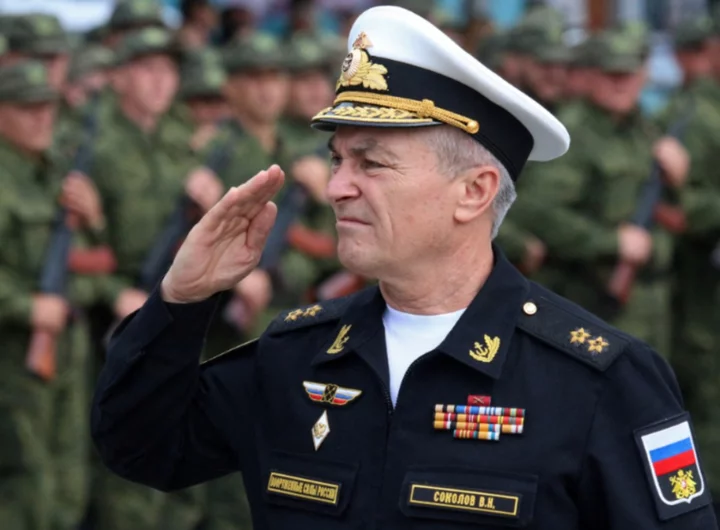
Ukraine-Russia war – live: Kremlin claims Britain helped plan missile strike on Crimea on Black Sea Fleet’s HQ
Black Sea fleet commander Viktor Sokolov has appeared in a second video aired on Russian TV, days after Ukraine claimed he was killed in a missile strike on Sevastopol. A TV station run by Russia’s defence ministry showed an interview with the commander on Wednesday saying the fleet was performing successfully, although it was unclear from his comments whether the clip was filmed after Ukraine’s missile strike on 22 September. Ukraine’s special forces said on Monday that Mr Sokolov and 33 other officers were killed in the missile strike carried out on the Black Sea Fleet’s headquarters in Crimea. The new video comes after Russia’s defence ministry released another clip on Tuesday, appearing to show Mr Sokolov on a video conference call with Russian defence minister Sergei Shoigu. It also remains unclear when this video was recorded. Ukraine is now saying it is working to “clarify” earlier reports that he had died. Russia has not yet directly confirmed or denied the claims. Read More Viktor Sokolov seen for second time in newly emerged video as he claims Russia’s Black Sea Fleet ‘performing successfully’ New video of ‘dead’ Russian Black Sea fleet commander raises doubts over Ukraine’s claim Hillary Clinton mocks Putin over Nato expansion: ‘Too bad, Vladimir. You brought it on yourself’ Ukrainian forces ‘enjoy success’ near Bakhmut as Putin deploys reserves
2023-09-27 19:15
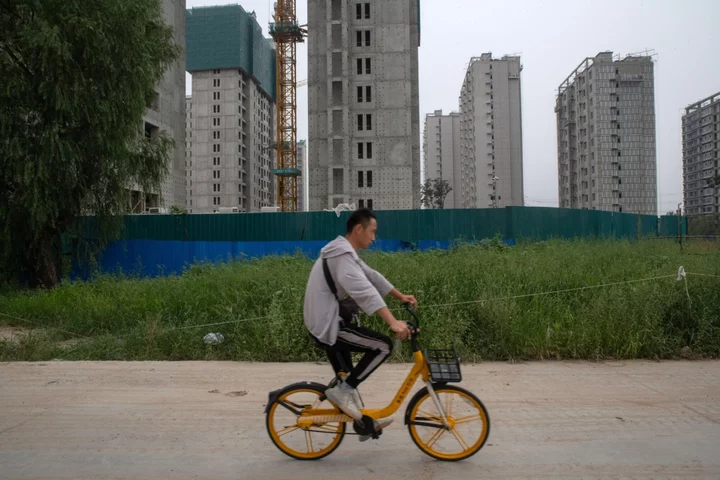
China Property Stocks Slide to Lowest Since 2011 as Rout Extends
Chinese property stocks tumbled to their lowest levels since October 2011 as worries about liquidity and weak housing
2023-09-27 17:53
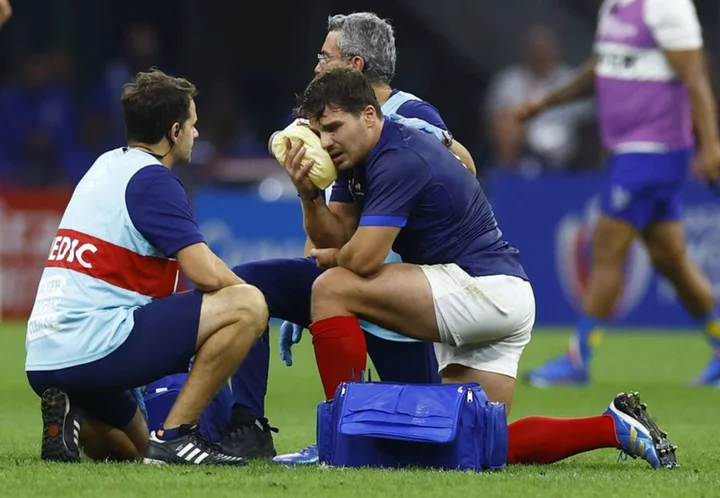
Rugby-Recovering Dupont on course for France's World Cup quarter-final
Antoine Dupont's recovery from surgery on a broken cheekbone is going very well and it may not be
2023-09-27 17:22
